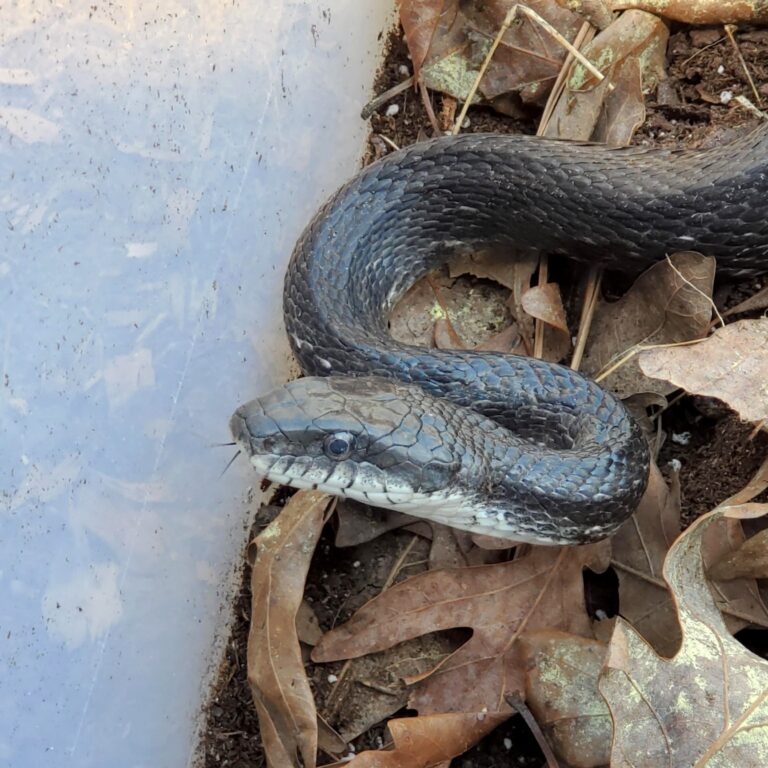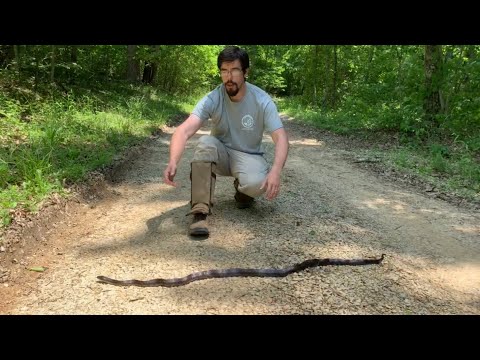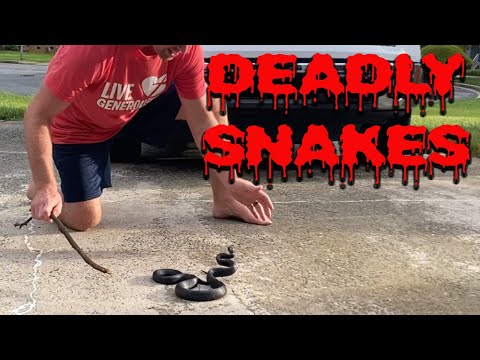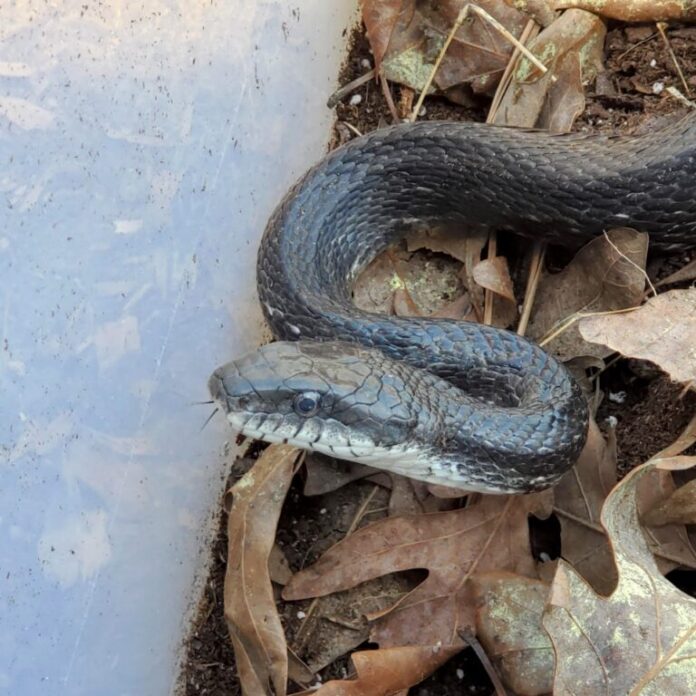Out of all the animals on Earth that slither or crawl, probably none are as subject to as much fundamental fear and revulsion as snakes.

Snakes as a category are practically synonyms for evil and treachery, and is no wonder that pretty much everyone avoids them and many people kill them on sight.
However, snakes have their own part to play in nature and the vast majority of snakes cannot hurt people and are usually only a nuisance to livestock or pets.
How about the black rat snake? Is the black rat snake dangerous?
No, black rat snakes are not dangerous to people. They’re not venomous and pose very little threat to pets and most livestock.
Black rat snakes are hardly any threat at all to human beings, outside of an incidental bite if you corner or try to handle one. But these snakes are certainly intimidating because they can grow quite large, and they are commonly seen on farms and homesteads around the country.
You don’t need to worry about these snakes, but you might need to take action to protect chickens and eggs from them.
Keep reading, and I’ll tell you what you need to know about these impressive specimens.
What Does the Black Rat Snake Look Like?
Black rat snakes are large snakes, averaging at least 3 ½ feet in length and capable of growing significantly longer than 6 feet.
All snakes, young and old, have a small, narrow and smooth heads with small beady eyes and a gently curved noses giving them a uniform appearance from front to back.

Black rat snakes are chunky and muscular, with a very thick appearance. This is because these snakes are all constrictors, and they physically overtake their prey and crush or suffocate it to death prior to eating.
Trust me; a mature adult will definitely get your attention when you spot one!
As you might have thought from the name alone, black rat snakes are almost always black with a pale or ivory-colored underbelly near the head and throat, and distinctively shiny scales all over.
It is worth noting that younger snakes, or juveniles, may have some indications of faint patterning that is left over from immaturity.
These young snakes look radically different, in terms of color and pattern, compared to adults and trend towards a pattern of brown or dark, umber colored patches interspersed with gray.

Where are Black Rat Snakes Found?
The typical habitat of the black rat snake is pretty much everywhere west of the Mississippi River. They’re found all over the Midwest and Southwest, and range all the way up to the northern edge of the country clear to Idaho, and a bit beyond.
These snakes can be found everywhere within this range, although they are especially common on farms and homesteads where chickens are kept owing to the preponderance of easy prey there in the form of mice and, occasionally chicks and chicken eggs.
Because these are among the most common of all snakes in their range, it is in your best interest to become intimately familiar with them so that you can positively identify them if encountered.
Misidentifying one of these snakes could end very poorly for the poor snake if it is assumed to be venomous, or for you, if you assume it is harmless when in fact it is not.
Are Black Rat Snakes Venomous?
No. Black rat snakes are not in any way venomous. These snakes are, as mentioned, constrictors, and constrictors dispatch prey by suffocating and crushing them, not by the injection of deadly venom.
Can the Black Rat Snake Kill Pets or Domestic Animals?
Potentially yes. Black rat snakes are often very large and powerful constrictors and there are wide-ranging predators of many other animals, including mammals.
This means that your pets or smaller livestock could potentially be at risk.
In the wild, the black rat snake will feed on many mammals, including larger rodents up to the size of raccoons and possums, so everything below that size category is definitely on the menu.
They’re also adept climbers and predators of birds and eggs sitting in bird nests.
As you were probably already anticipating, this can spell trouble if you have chickens, chicks, and eggs lying there ripe for the taking.
All are definitely in danger of being preyed upon by a black rat snake.
Potentially, smaller dogs, small breed lambs or kids, and even smaller cats could likewise fall prey to them, though larger mammals like adult goats, sheep, cows and dogs have nothing to fear except if they get spooked by the snake.
Will Black Rat Snakes Attack Humans?
As a rule, no. Most rat snakes will flee or try to get out of the way if they are approached by a human or any other large mammal for that matter.
But, they can be food aggressive and when they are on the hunt or closing in on prey they might choose to stand their ground and issue a threat display.
This is particularly scary because they will coil into the same S-shaped position that many venomous snakes will. Considering the size and power of these snakes, it is probably a display you will not soon forget!
If you are foolish enough to try and physically restrain a black rat snake things will probably go badly for you. These muscular snakes will fight with amazing endurance and strength, and they have even been known to fight off predators like coyotes and birds of prey.
Bottom line, if you mess with them or don’t give them space, they will try to bite you!
Will a Black Rat Snake Bite Hurt You?
Yes, definitely. Even though they are not venomous black rat snakes have several rows of dagger-like, razor-sharp teeth that they use to grip prey prior to crushing the life out of them.
Considering how large and strong these snakes are, a powerful bite from them is definitely going to lacerate you and snake bites routinely become infected.
Do everything you can to avoid being bitten by a black rat snake and, if you’re forced to attempt to capture one, I recommend wearing heavy leather gloves with gauntlets or even chainmail gloves of the type used to protect against cuts.
Is it Best to Kill Black Rat Snakes When You Can?
This is a tough call. The bottom line is that, if you raise smaller animals like poultry, rabbits or even smaller breeds of sheep and goats, you probably have a very good cause to eliminate a black rat snake before it starts poaching your eggs or young.
And believe me, they will and will do so regularly.
If you can, and you have the time and inclination, it is best to capture the snake and relocate it to somewhere distant from your property.
These snakes are important, and they play a necessary role in nature.
However, I wouldn’t necessarily risk being bitten by one considering how large and strong they are, or risk them harming a pet or child.
Black rat snakes are among the most numerous and successful snakes, so if you have just one or two regular troublemakers on your property, take them out.


